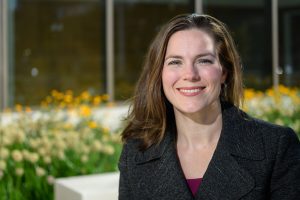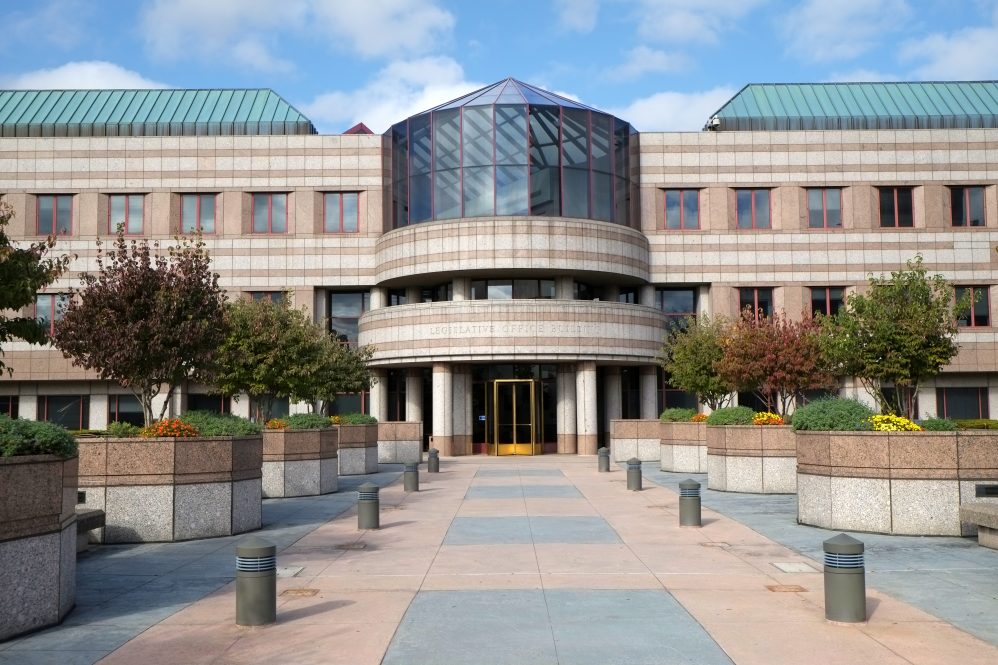As legislators ready for the start of session next month, one state representative is striving to connect policymakers with university researchers and the work they’re doing on things like extreme rainfall trends, clean indoor air in schools, and the success of overdose prevention centers.
“Moving Beyond Implications: Research into Policy,” a day-long conference scheduled for Tuesday, Jan. 9 at the Legislative Office Building in Hartford, has been designed not just to make those connections but also to encourage change, using science to influence law.
“What’s interesting, starts conversations. What’s interesting, starts partnerships. When people can see alignment in both their interests and their needs, those partnerships are likely to be sustained, carried forward, and meaningful,” co-organizer Kerri Raissian, an associate professor in UConn’s School of Public Policy, says.
Raissian and state Rep. Jaime Foster, a Democrat whose 57th District encompasses East Windsor, Ellington, and part of Vernon, meet years ago not as constituent and representative, but as fellow academics.
Foster ’12 (CAHNR), ’14 MS, ’17 Ph.D., a three-time Husky who also did her post-doc work at UConn in 2018 and now is a research scientist, says the friendship that’s developed between her and Raissian is one of the things that’s allowed “Moving Beyond” to come to fruition.
Last fall, Foster says, the two were on a panel sponsored by UConn’s Institute for Collaboration on Health, Intervention, and Policy (InCHIP), when Foster says she started to think about how often she’s been tapped as a conduit for legislators wanting to see scientific research before logging a vote and for researchers wanting to show their work to legislators to help influence those decisions.

A few days later, she texted Raissian with the idea for a conference to bridge the gap and soon InChip and the Connecticut Scholars Strategy Network (CT SSN), of which Raissian is a co-leader, signed on as sponsors.
“Since I’ve been at the Capitol, I have noticed there are challenges in the way legislators talk about the state of science or understand the state of science,” Foster, co-organizer, says. “The biggest obstacle is that science gets summarized and delivered through a game of telephone: A scientist publishes their work in a journal that’s behind a paywall, then someone at the Capitol pays for the article or worse, they just read the abstract. They summarize it for someone else, who summarizes it for someone else, each time making it more lay but perhaps more inaccurate.”
With each summarization, the study becomes diluted and its conclusions tend to become more absolute, when in fact most are more nuanced, Foster says.
“There are also times when policymakers know there is more information needed but they’re not clear where to go,” Foster says. “I can’t tell you how many times I’ve been on a committee and people have said, ‘I found this research paper online, but I can’t read the whole thing.’ On multiple occasions the chair has turned to me and asked if I can get the paper for them.”
And while she says she’s happy to do so, there must be another way, and that starts by making connections.
“Children’s mental health, for instance, is going to continue to be a top priority of the Education and Children’s committees until we have made significant progress,” Foster says. “I don’t know that a lot of legislators know there’s a researcher who’s using puppets to improve children’s mental health.”
UConn Board of Trustees Distinguished Professor Sandra M. Chafouleas, who co-developed the award-winning Feel Your Best Self puppet program, will be at “Moving Beyond” with Jessica Koslouski, an assistant research professor at UConn, to talk about their work on social emotional learning.
Raissian says researchers also might not know who to contact or how to get their work in the right person’s hands. And even if that happens, without a relationship, lawmakers may not know where to direct follow-up questions: What does a study mean for a specific group of constituents? And researchers don’t always know what’s important to legislators.
“Both of these groups sometimes operate in isolation of each other, not intentionally just because it’s a busy world. We just don’t do a good job of talking to each other and without talking to each other it’s hard to know what the other person is seeking, what the other person needs, and how we can work together,” Raissian says. “Part of this conference is about partnerships and being able to work together to disseminate research and create research that can make Connecticut policy the best it can be.”
Foster says they solicited abstracts from Connecticut researchers at institutions including UConn, UConn Health, Trinity College, and Yale University, selecting about half the submissions based on how they aligned with the anticipated work of various legislative committees. They also sought input from committee chairs on what they expect policy agendas to look like.
“It was a competitive process and I wish we didn’t reject anyone because the whole point I’m trying to make is that if you think your science is worth informing policymakers about – it is. And if you’re not going to talk about it, there will be someone else who feels comfortable speculating on your science based on a summary of it,” she says.
There are times when people have come before a committee to testify on a piece of proposed legislation and used a scientific study to bolster their argument, Foster says, and they’re not scientists themselves. She’s caught errors, miscalculations, and false conclusions.
“The only reason I figure it out is because I look at graphs, studies, and scientific information all the time,” Foster says, adding she hopes the conference can become an annual event prior to each session.
“Moving Beyond” is expected to draw Lt. Gov. Susan Bysiewicz, House Majority Leader Jason Rojas, House Republican Leader Vincent Candelora, and representatives from Gov. Ned Lamont’s office and the offices of U.S. Reps. Jim Himes and Joseph D. Courtney.
Also, officials from PURA; the Office of Fiscal Analysis; departments of Developmental Services, Public Health, Labor, Agriculture, Social Services, and Energy and Environmental Protection; Connecticut Children’s Medical Center; Capitol Region Education Council; and Child Health and Development Institute are expected to attend.
“My hope is that by the end of the day, every committee chair who is at the meeting has a personal relationship with at least one scientist, and every scientist knows the chair of the committee of cognizance related to their research,” Foster says. “If that happens, if those introductions are made and those hands are shook, we’re in great shape.”
Those who would like to attend need to RSVP online. The legislative session begins Feb. 7.



